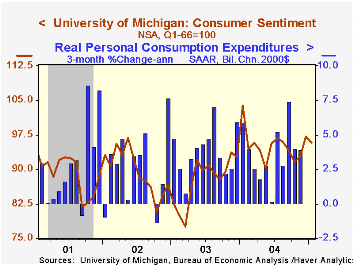 Global| Jan 21 2005
Global| Jan 21 2005Lower Expectations Dropped U.S. Consumer Sentiment in January
by:Tom Moeller
|in:Economy in Brief
Summary
The University of Michigan's preliminary reading of consumer sentiment in January fell to 95.8 versus Consensus expectations for little change m/m at 97.5. During the last ten years there has been a 74% correlation between the level [...]

The University of Michigan's preliminary reading of consumer sentiment in January fell to 95.8 versus Consensus expectations for little change m/m at 97.5. During the last ten years there has been a 74% correlation between the level of consumer sentiment and the y/y change in real PCE.
Consumer expectations slumped 5.0% m/m and reversed nearly all of a 6.7% jump in December. The decline in expectations was to the lowest level since last May.
The reading of current conditions improved for the fourth consecutive month to the highest level since late 2000. During the last ten years there has been an 81% correlation between the current conditions index and y/y growth in payroll employment.
Sentiment amongst families earning less than $50,000 per year reversed most of the surge in December (+5.3% y/y. Consumer sentiment amongst families earning more than $50,000 per year rose moderately (-8.9% y/y).
The University of Michigan survey is not seasonally adjusted.The mid-month survey is based on telephone interviews with 250 households nationwide on personal finances and business and buying conditions. The survey is expanded to a total of 500 interviews at month end.
This 2003 article from the Federal Reserve Bank of Richmond examines "Why Does Consumer Sentiment Predict Household Spending?"
| University of Michigan | Jan | Dec | Y/Y | 2004 | 2003 | 2002 |
|---|---|---|---|---|---|---|
| Consumer Sentiment | 95.8 | 97.1 | -7.7% | 95.2 | 87.6 | 89.6 |
| Current Conditions | 110.4 | 106.7 | 0.8% | 105.6 | 97.2 | 97.5 |
| Consumer Expectations | 86.4 | 90.0 | -13.7% | 88.5 | 81.4 | 84.6 |
Tom Moeller
AuthorMore in Author Profile »Prior to joining Haver Analytics in 2000, Mr. Moeller worked as the Economist at Chancellor Capital Management from 1985 to 1999. There, he developed comprehensive economic forecasts and interpreted economic data for equity and fixed income portfolio managers. Also at Chancellor, Mr. Moeller worked as an equity analyst and was responsible for researching and rating companies in the economically sensitive automobile and housing industries for investment in Chancellor’s equity portfolio. Prior to joining Chancellor, Mr. Moeller was an Economist at Citibank from 1979 to 1984. He also analyzed pricing behavior in the metals industry for the Council on Wage and Price Stability in Washington, D.C. In 1999, Mr. Moeller received the award for most accurate forecast from the Forecasters' Club of New York. From 1990 to 1992 he was President of the New York Association for Business Economists. Mr. Moeller earned an M.B.A. in Finance from Fordham University, where he graduated in 1987. He holds a Bachelor of Arts in Economics from George Washington University.
More Economy in Brief
 Global| Feb 05 2026
Global| Feb 05 2026Charts of the Week: Balanced Policy, Resilient Data and AI Narratives
by:Andrew Cates






